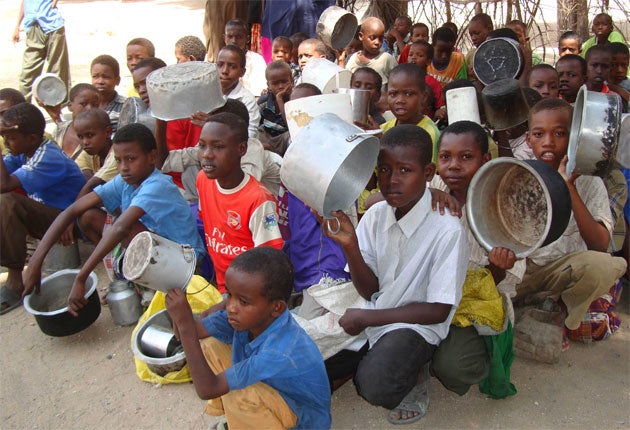Starvation looms as UN suspends Somalia food aid

Your support helps us to tell the story
From reproductive rights to climate change to Big Tech, The Independent is on the ground when the story is developing. Whether it's investigating the financials of Elon Musk's pro-Trump PAC or producing our latest documentary, 'The A Word', which shines a light on the American women fighting for reproductive rights, we know how important it is to parse out the facts from the messaging.
At such a critical moment in US history, we need reporters on the ground. Your donation allows us to keep sending journalists to speak to both sides of the story.
The Independent is trusted by Americans across the entire political spectrum. And unlike many other quality news outlets, we choose not to lock Americans out of our reporting and analysis with paywalls. We believe quality journalism should be available to everyone, paid for by those who can afford it.
Your support makes all the difference.Up to a million people are facing starvation in southern Somalia after the World Food Programme was forced to suspend operations yesterday following threats and attempted extortion by armed militants.
Much of the nation south of Mogadishu is under the control of the extremist militia al-Shabaab, which has accused international agencies of acting as foreign spies and threatened to expel them. Four WFP staff have been killed in Somalia since August.
"We've postponed this decision for as long as we could," said WFP spokesman Peter Smerdon in Nairobi. "But there's a moment that comes when the risks involved are too high. Rising threats and attacks on humanitarian operations, as well as the imposition of a string of unacceptable demands, have made it virtually impossible."
In November al-Shabaab issued a string of demands to aid agencies including the removal of women from all jobs and the payment of US$20,000 (£12,000) for protection every six months from each of the regional offices. When the WFP refused, it was ordered to cease all operations by 1 January.
The UN food agency said it was closing half a dozen of its offices in the south, which affects close to one million vulnerable people, mainly women and children. UN operations in neighbouring Kenya and Ethiopia have been stepped up, along with WFP centres in the Somali capital, in anticipation of a possible mass migration from the affected areas.
The withdrawal was greeted with jubilation in the al-Shabaab stronghold in the southern port of Kismayo. "It is our great pleasure to see WFP and the other spy agencies suspend their involvement," Sheikh Ibrahim Garweyn, head of public affairs, told Reuters. "We will never allow them to come here again. We have great land and we can grow our own crops."
Contrary to the Sheikh's upbeat assessment, the lawless country which has been without a functioning central government since 1991 has not historically been able to feed itself. After nearly two decades of constant conflict even a good harvest meets less than a third of the country's food needs. An epic drought has struck the region and left nearly half the population in need of food aid. This has meant WFP feeding an estimated 2.6 million people countrywide.
Analysts have linked the attempt to blackmail WFP to a critical funding shortage in the Islamic insurgency. The network of young fighters has built its formidable force on the back of a reliable monthly pay cheque of $300 which has proven to be a powerful recruitment device. However, in recent weeks Somali sources say that word has gone out to regional Shabaab commanders that they must pay their own way, leading to a surge in extortion from businesses and aid groups.
"They've run out of money which is why they're looting," Abdirasak Mohamed Aden, a senior adviser to the Somali government, said by telephone from Mogadishu. "Their popular support is shrinking and they're having to collect taxes but in places like Kismayo there's no business left."
Al-Shabaab, which claims allegiance to al-Qa'ida, has vowed to topple the weak, UN-backed transitional government which it denounces as a foreign puppet. The militants have been able to hem government forces into a small area of the capital where they survive thanks to the support of African Union troops. However, a suicide bombing on a university graduation ceremony last month which killed 22 people has undermined popular support for the militants.
The world's biggest refugee camp stands in Dadaab, just across the border in northern Kenya. Even before WFP suspended operations thousands of Somalis were arriving at the semi-desert camp every week which has now swollen to more than 300,000 people.
Join our commenting forum
Join thought-provoking conversations, follow other Independent readers and see their replies
Comments